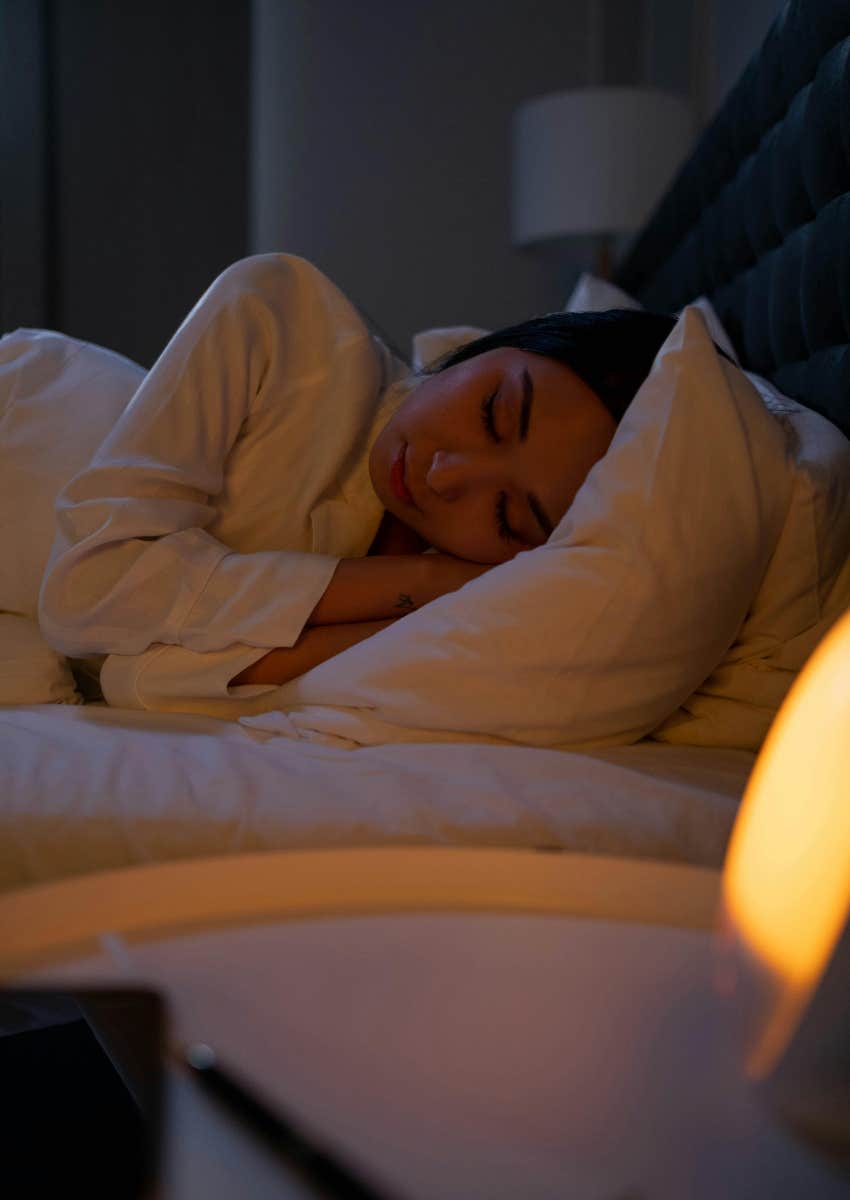If You Fall Asleep In Any Of These 4 Positions, Your Brain May Be Trying To Tell You Something Important
Most of us don't even pay attention to our position when we fall asleep, but it could actually be a meaningful sign.
 Krakenimages.com | Shutterstock
Krakenimages.com | Shutterstock Do you have a favorite sleeping position, or do you kind of just collapse into bed and go with the flow? The shape you take when you lie down to rest at the end of the day may seem meaningless, but it can actually tell you a lot about your well-being.
Maybe you wrap your arms across your chest, similar to a mummy, or you look like a tree climber with one leg spread out at a weird angle. Perhaps you choose something that feels comforting like curling up in the fetal position or hugging a pillow. Whatever it may be, a gut health doctor named Laurel shared that these four positions have something very important in common.
Falling asleep in any of these four positions means your nervous system is quite literally stuck.
We’ve all heard about the possibility that our nervous systems can get stuck in survival mode. Your brain and body end up torn between fight and flight and you just really don’t know what to do. We live in a fast-paced world where pretty much everything feels at least a little anxiety-inducing, so it’s not surprising that many people live life pretty stressed. There’s a way to tell if you’re stuck in survival mode beyond just feeling that awful discomfort, though.
According to Laurel, falling asleep in any of those four positions — the mummy, the tree climber, the fetal position, or the pillow-hugger — means your brain is telling you that your nervous system is not in check. She said that favoring one of those positions means “it’s likely your nervous system is stuck in survival mode. These positions can be signs of chronic stress, high cortisol, or a dysregulated body.”
The anxiety we feel when we’re awake has a lot to do with the quality of our sleep.
Dr. Annise Wilson, an assistant professor of neurology and pulmonary, critical care and sleep medicine at Baylor College of Medicine explained, “High levels of stress impair sleep by prolonging how long it takes to fall asleep and fragmenting sleep. Sleep loss triggers our body’s stress response system, leading to an elevation in stress hormones, namely cortisol, which further disrupts sleep.”
It’s a vicious cycle, and the reverse is also true. Not only does stress affect our sleep, but sleep also affects our stress. According to an American Psychological Association (APA) survey, 21% of adults said their stress levels were heightened when they didn’t get enough sleep. That’s pretty problematic considering most adults only sleep 6.7 hours each night when the recommendation is seven to nine hours.
Being stuck in survival mode is uncomfortable, but it is possible to get out of it.
Counselor Kayla Patterson, MA, LMHCA, NCC, shared, “The term ‘survival mode’ often refers to a period of overwhelm in which nervous system activation occurs, and individuals have difficulty devoting energy to anything other than what is necessary to maintain survival. While in a survival mode state, an individual constantly functions in an evolutionary fight-or-flight response.”
 cottonbro studio | Pexels
cottonbro studio | Pexels
Patterson added, “People can become stuck in survival mode due to chronic stress, overwhelming life challenges, or trauma.” This follows what Laurel said about high cortisol levels. Cortisol is known as the “stress hormone.” but it’s far more than just how stressed you are. Health writer Rebecca Joy Stanborough, MFA, explained that cortisol is related to both stress and sleep. Both “share the same pathway,” the hypothalamic pituitary adrenal (HPA) axis.
So, the level of stress you’re living with definitely has a direct impact on your sleep. If you’re falling asleep in one of these four positions, it likely means that your cortisol levels are way too high and your nervous system is deteriorating. Pay a little more attention to the position you fall asleep in and if it's one of the four positions Laurel mentioned, try implementing some self-care in your routine.
Mary-Faith Martinez is a writer with a bachelor’s degree in English and Journalism who covers news, psychology, lifestyle, and human interest topics.

